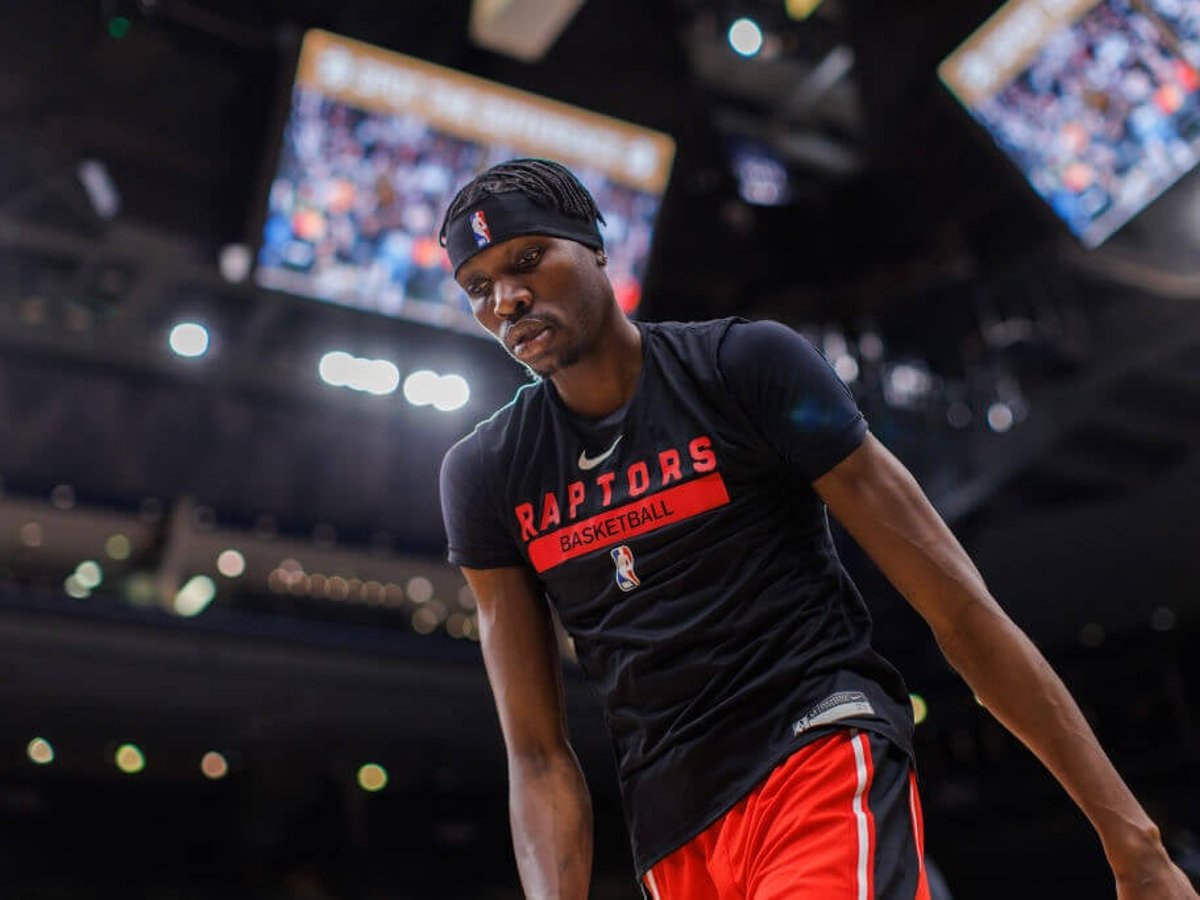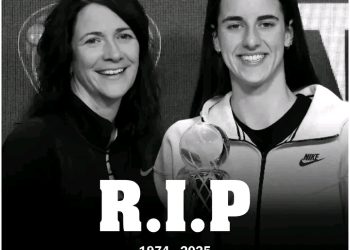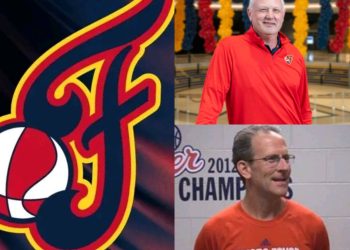It would be reasonable if you’ve forgotten about Khem Birch — even if you’re a Toronto Raptors fan.
The Raptors traded him to the San Antonio Spurs as the matching salary in the Jakob Poeltl trade. He never played a game for the Spurs. His last NBA game, at this point, was on Dec. 29, 2022, before a right knee injury effectively ended his year. The Spurs waived Birch in October, and he signed with the Marc Gasol-founded Bàsquet Girona of the Spanish league in February 2024. He played 12 games, averaging 8.8 points and 5.6 rebounds per contest.
In a fun twist, Birch might make the Canadian Olympic team, especially after Zach Edey pulled his name from consideration on Sunday. Canada will need more size beyond Kelly Olynyk, Dwight Powell and Trey Lyles. He worked his way into the league after going undrafted and spending three years overseas. This is no shade to Birch. If he ends up in France, he will have earned it. With that said, while Birch was trying to resurrect his career in Spain last year, he was in the last year of his NBA contract, making nearly $7 million not to play. A pretty good gig.
That brings us to the Raptors, who have done little in free agency, save for extending the contracts of their core players, Scottie Barnes and Immanuel Quickley. The moment they picked up Bruce Brown’s player option for 2024-25, which will pay him $23 million, they became likely to do very little. It meant they would have less than the full non-taxpayer midlevel exception to spend while staying under the salary cap, and Raptors president Masai Ujiri is not going to suggest Maple Leaf Sports and Entertainment spend into the tax on a team that will be projected to win more than the 25 games they won last year, but fewer than 40.
They are in that position, in part, because of how they have handled players such as Birch — veterans who have filled in capably in narrow roles but have never seemed like essential cogs on winning teams. Now, it is the third year of Chris Boucher’s contract that is in the way of the Raptors having more room to maneuver.
The Raptors chose this route. When they traded Jalen McDaniels for Davion Mitchell, Sasha Vezenkov and two second-round picks, they took on about $8 million in extra salary. That helped the Sacramento Kings dip below the tax threshold, hence the sweetener of two picks.
It was also the difference between the Raptors having about $18 million to fill out their roster — enough to use the full MLE and sign second-round picks, Jonathan Mogbo and Jamal Shead, using exceptions and staying below out of the tax — and having around $10 million, which isn’t enough to do all of that. As a result, not only will Gary Trent Jr. likely leave in free agency, but they weren’t able to spend the full MLE on any player, even if they wanted to balance their roster. (They are short on bigs and bigger wings.) The Raptors likely filled out their roster on Monday evening when they agreed to terms with Garrett Temple, a team source confirmed to The Athletic. If Mogbo and Shead are signed using the second-year exception, the Raptors will have 15 players on fully guaranteed deals.
Assuming it's the veteran minimum, Temple will earn $3.3 mil, but it will only count for $2.1M against the cap.
— (((Eric Koreen))) (@ekoreen) July 1, 2024
Maybe you (and the Raptors) aren’t all that sad about losing Trent. His likely departure will go down as yet another case of the Raptors losing a rotation-level player for no return, but allowing him to walk allowed the Raptors to make the Sacramento trade. Then again, adding Trent to the outbound side of that ledger makes it less of a heist.
If they had been stingier with Boucher, they would not be in this position. When the Raptors signed him to a three-year, $37-million deal in 2022, Boucher was coming off his two best seasons, posting more than six win shares in both. It was a fine value, but the contract started above the MLE, descending as it progressed. Due to his slender frame, Boucher is a peculiar NBA fit. At that point, he had been an above-average 3-point shooter just once in four seasons. He cannot reliably guard bigger centres, meaning he usually has to play with another big, which creates spacing issues. His strengths are on the offensive glass and running the floor. In other words, he is a depth forward.
Guaranteeing that type of player three years — Boucher was 29 when he signed the deal — for a non-contending team is a dangerous game. The Raptors thought they were on an upward trajectory then, which was surely part of the math. We can argue about that judgment for a while (and we have), but it is important context. Still, the contract raised an obvious question: Who were they bidding against?
The same can be said for Birch, who came in at the end of the Tampa Tank season and was serviceable after Aron Baynes and Alex Len cratered the centre spot. The Orlando Magic had just waived Birch. Any team could have signed him. Why was he worth a three-year deal a few months later?
At about $20 million total, it wasn’t an onerous cap clogger, but the Raptors ended up attaching a first-round pick and two seconds along with Birch to get Poeltl. The Raptors got the far more valuable player in that deal, but maybe they keep one of the two seconds they gave the Spurs if Birch’s contract had been expiring in 2023 instead of 2024. You can say second-round picks usually don’t result in much, and you’d be right. But you cannot applaud the savvy Sacramento trade while saying the picks that went to San Antonio didn’t matter.
The Raptors have made the same mistake with players coming to Toronto from outside the organization, such as giving Stanley Johnson, Svi Mykhailiuk and McDaniels two-year contracts. Those deals were all minor ones, risks worth taking when the upside was a nice rotation player. That the Raptors haven’t hit on those deals is disappointing, but they have been grounded in realism. The Birch and Boucher deals both felt a year too long in the moment.
They aren’t massive mistakes. Every dollar you spend represents an opportunity cost in any economy that limits spending, but these didn’t derail the Raptors in the big picture. They were small errors and wound up hurting the Raptors in small ways. Maybe this one didn’t even hurt: Multi-year MLE deals usually end up being bad for teams. The extra year on Boucher’s contract might keep them from making another mistake.
Those small defeats add up, though. After the NBA Draft concluded on Thursday, Raptors GM Bobby Webster made an interesting comment.
“One of the other general managers told me — he said, ‘Bobby, the good thing is there’s no emotion attached to draft picks,’” Webster said.
The implication is it is easier to make cold calculations when dealing with draft picks (inanimate objects of debatable value) than players (real human beings who you know and, often, appreciate). That is the way it should be. It is also the front office’s job to do its best to separate that affection from those calculations.
The Raptors have been criticized, often rightly so, for holding on to the likes of Kyle Lowry, Fred VanVleet and Pascal Siakam for too long. The Raptors take pride in doing right by their players, but that has to end somewhere. (It seems to have ended with Trent, who was eligible for an extension for the last year.) The Raptors haven’t held the lines in certain situations. Rewarding your own players when team goals haven’t been met cannot be an operating principle.











